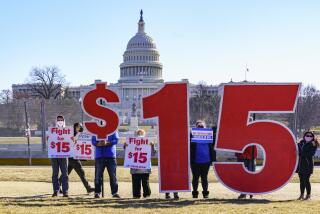Letters: Welfare fixes, right and left
- Share via
Re “Why get off welfare?” Opinion, Aug. 22
I never cease to be amazed at the singularity of economic solutions proposed by conservative thinkers. When arguing taxes, conservatives insist that cutting them will encourage small businesses to create jobs, providing a broader taxpaying base, while increasing taxes will reduce jobs and therefore reduce the amount of taxes going to government.
In his article, Michael Tanner argues that if benefit payments were lower than wages for entry-level jobs, it would encourage the poor to seek work.
Why not increase the minimum wage instead? Would that not also encourage the poor to seek employment?
Jack Berens
Alta Loma
I hate these pieces from detached think tank analysts who do all these calculations without bothering to actually interview people to find out why they are where they are.
After working about 30 years in the welfare system in the state of California, here are things he didn’t take into consideration.
Lack of affordable housing: The high rents in many areas and years-long waiting lists for subsidized housing make a joke out of his projection.
Lack of education and job history: We did get many people off the rolls and into jobs when the 1996 Welfare to Work rules became effective. What’s left are those who have a multitude of educational problems, including language barriers.
Child care and transportation: Two of the biggest barriers to employment, especially in areas that don’t have good public transportation. And guess which benefits are the first to be cut when there is a budget crisis?
Chris Cheney
Santa Ana
Tanner correctly points out that the many benefits made available to individuals on welfare exceed the value of what they can earn by working. In order for parents to do what is best for their families, they have made the calculation that it is wiser to remain unemployed than to put their children in greater financial jeopardy.
His solution for rectifying this problem is to make benefits harder to receive and to reduce those benefits.
He has totally ignored an obvious idea that would go a long way toward mitigating the problem: Index the minimum wage to a minimum cost of living.
Ron Garber
Duarte
Tanner’s “welfare recipient” is reminiscent of Ronald Reagan’s fictionalized “welfare queen” living high off the hog at public expense and driving a Cadillac. Reagan’s welfare queen was a composite creation meant to distract the voting public from the enormous disparity in wealth in this country.
Among the things Tanner does not tell: What percentage of people on welfare actually make $36,000 a year, which is far more than I live on. Or, what percentage of those on welfare live below the poverty line. Or, how many people who are eligible for welfare programs don’t take them or simply don’t know about them.
David Silva
Seal Beach
I cannot wait to read the other letters that will label this article and its author mean-spirited.
Someone will quote the Bible; another will talk about the secular need for compassion and altruism; a third will dispute the math or statistics; I’m wagering that a fourth response from an actual welfare recipient claiming it as an entitlement could be printed as well.
None would change the conspicuous truth that our elected officials have established a system of reward that nourishes the unproductive.
Altruism has its place, especially for those with disabilities. But to incentivize people to turn their back on opportunity is generosity misplaced. Tanner’s analysis and suggestions toward a cure are unimpeachable.
Glenn Toth
Playa Del Rey
The piece actually makes a good argument for decent wages and benefits. Shouldn’t work pay more than welfare?
Julie Ziegler
Torrance
More letters to the editor ...
More to Read
A cure for the common opinion
Get thought-provoking perspectives with our weekly newsletter.
You may occasionally receive promotional content from the Los Angeles Times.









